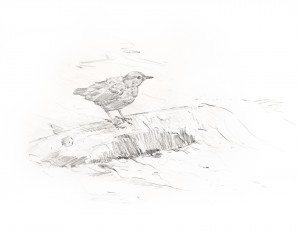Birding through dementia
This is an excerpt from Why We Bird, a new book published this month by Golden Gate Bird Alliance.
By David C. Rice
For fifteen years I took annual bird trips with the hawk-guys [a group of friends who loved raptors]. Then Marty, my best friend in the group, in only his sixtieth year, suffered dementia. While he still could, we all wanted to take one last trip together.
Our first destination was the Diablo Range, east and south of San Jose. Just a ninety minute drive from where we lived, it still looked like the California of a hundred years ago; the slopes are too steep to develop into foothill ranchettes. Birders usually explore this area in the spring, when the breeding birds are loud and colorful, but I did not think our trip could wait that long. Marty already had trouble sharing thoughts and feelings, and his short-term memory was almost gone.
When we told him about the trip he was excited. He still wanted to see birds. John Baker wrote, “honest observation is [not] enough. The emotions and behavior of the watcher are also facts, and they must be truthfully recorded.” I wanted to go birding with Marty one last time, but I did not know what the trip would reveal.

Early the first morning at a roadside pull-out I estimated an extraordinary two hundred Western Bluebirds and three hundred Cedar Waxwings in the sky, in the tops of trees, and on the fence near our van. Many were feeding on mistletoe berries. Marty seemed to enjoy the big flocks. A few pull-outs later we learned that dementia had not impaired his ability to find birds. He was the one to spot a distant woodpecker halfway up a hill against the side of a burnt tree. Later a Greater Roadrunner ran, paused, and ran again along the base of a cliff. I was glad to show it to him. He had seen roadrunners as a child in Southern California.
At one stop Marty tried to tell us that Native Americans had used buckeye seed pods to paralyze and then catch fish. He was looking at a buckeye tree as he talked but was unable to remember its name. It took us a while to figure out what he meant. After staring at the depth of his loss and my helplessness to do anything about it, I consoled myself with the thought that birding was a perfect activity for him today. Though he could not keep up an extended conversation or always remember the name of what we was looking at, he could still find birds and could still look at the ones we called out. There is much more to birding than the names of birds, and I knew he felt that.
We left the Diablo Range at mid-day and drove south to some of the few remaining marshes in the Central Valley. It was a Saturday in November, a duck-hunting day. We saw more decoys than ducks. We also saw Marty’s short-term memory problem when, just after our car flushed a bittern, he asked if we had seen one. A minute later, though, he was the first to point out a distant flight of Snow Geese.
On the last morning before returning home, we visited the Merced Wildlife Refuge. A Short-eared Owl flew from one of the few trees in sight and Mourning Doves cooed. Were the doves making the other hawk-guys feel sadder, too? I asked Marty the next week what he liked best about the trip. “The owl,” he said with a grin.
———————————–

Why We Bird is available for $12 (paperback) or $4.99 (Kindle e-book) from whywebird.com. Golden Gate Bird Alliance members may purchase it at a discounted price of $10 at events like our Christmas Bird Count, from our office, or from our online store.
David Rice will be signing copies of Why We Bird at our Holiday Open House this Friday December 13, at 2530 San Pablo Avenue in Berkeley (at Blake). The open house runs from 5 to 8 p.m., and David will be there from 5:30 until 7 p.m. Please join us!
About the Author: David Rice has a junior Audubon pin on his bulletin board but did not buy a pair of binoculars and start birding until his mid-twenties. When he wanted to know more, he took Joe Morlan’s bird identification classes in San Francisco and joined Golden Gate Bird Alliance. A Berkeley psychologist, David is a former GGBA board member and a co-author of the Alameda County Breeding Bird Atlas.
